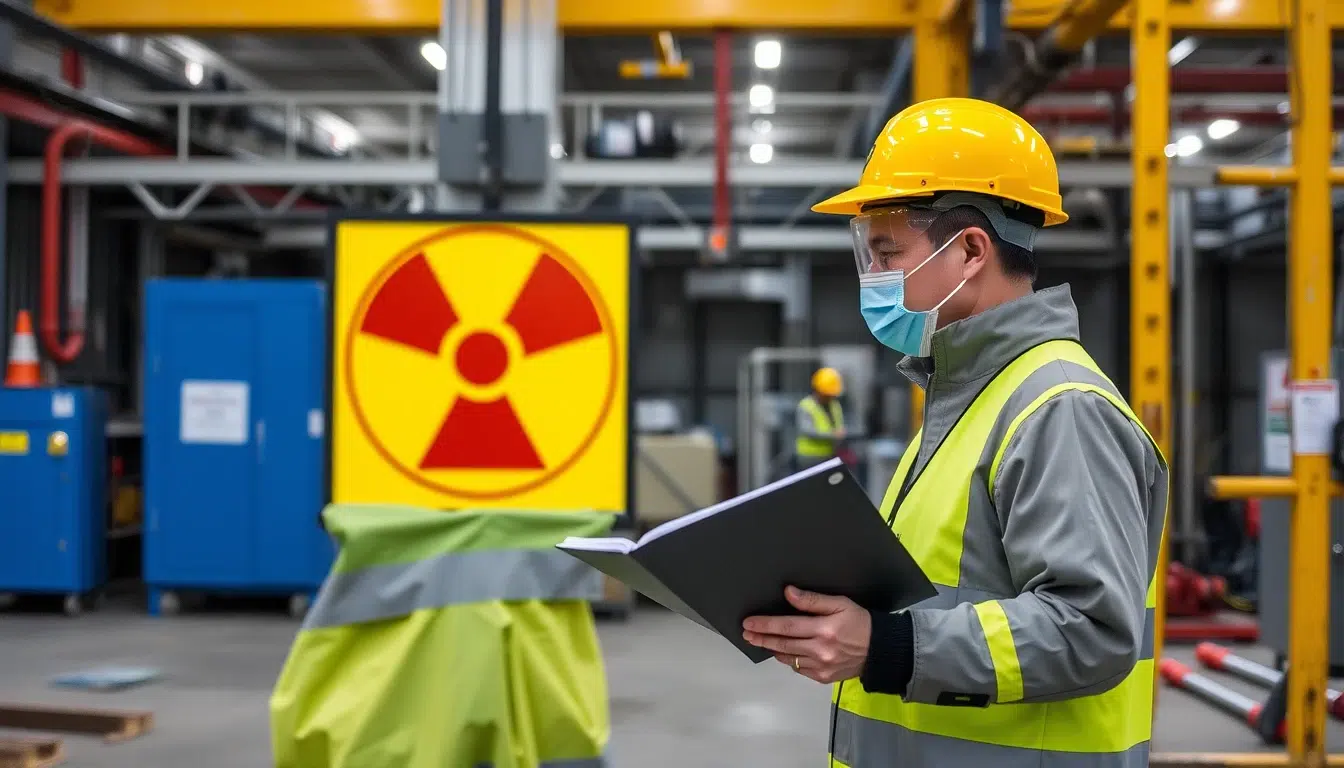Health, Safety and Environment (HSE) Training Course for Ports & Oil and Gas Industry

| Date | Format | Duration | Fees (USD) | Register |
|---|---|---|---|---|
| 08 Feb - 12 Feb, 2026 | Live Online | 5 Days | $3785 | Register → |
| 09 Mar - 17 Mar, 2026 | Live Online | 7 Days | $5075 | Register → |
| 25 May - 29 May, 2026 | Live Online | 5 Days | $3785 | Register → |
| 15 Jun - 03 Jul, 2026 | Live Online | 15 Days | $11515 | Register → |
| 16 Aug - 27 Aug, 2026 | Live Online | 10 Days | $7735 | Register → |
| 09 Sep - 11 Sep, 2026 | Live Online | 3 Days | $2625 | Register → |
| 01 Nov - 05 Nov, 2026 | Live Online | 5 Days | $3785 | Register → |
| 07 Dec - 18 Dec, 2026 | Live Online | 10 Days | $7735 | Register → |
| Date | Venue | Duration | Fees (USD) | Register |
|---|---|---|---|---|
| 17 Feb - 19 Feb, 2026 | Amman | 3 Days | $4680 | Register → |
| 23 Mar - 10 Apr, 2026 | Dubai | 15 Days | $13500 | Register → |
| 20 Apr - 01 May, 2026 | Paris | 10 Days | $11615 | Register → |
| 04 May - 08 May, 2026 | Kuala Lumpur | 5 Days | $5575 | Register → |
| 31 Aug - 04 Sep, 2026 | Dubai | 5 Days | $5775 | Register → |
| 21 Sep - 02 Oct, 2026 | Cairo | 10 Days | $11085 | Register → |
| 12 Oct - 16 Oct, 2026 | London | 5 Days | $6305 | Register → |
| 21 Dec - 25 Dec, 2026 | New York | 5 Days | $6835 | Register → |
Did you know that effective HSE practices in the upstream oil and gas industry can significantly enhance operational safety and environmental protection, with research showing that robust HSE management systems lead to reduced incidents, improved regulatory compliance, and enhanced operational efficiency?
Course Overview
The Health, Safety and Environment (HSE) Training Course for Ports & Oil and Gas Industry by Alpha Learning Centre is meticulously designed to equip professionals with essential skills in advanced HSE practices tailored to ports and oil/gas operations. This course focuses on how professionals can effectively manage environmental impacts, enhance risk assessment skills for high-risk environments, and improve emergency preparedness and response capabilities to ensure comprehensive operational excellence in modern port and oil/gas facilities.
Why Select This Training Course?
Selecting this HSE Training Course for Ports & Oil and Gas Industry offers numerous advantages for professionals involved in HSE management, operations, and compliance in these sectors. Participants will gain advanced knowledge of risk assessment methodologies, environmental management strategies, and emergency response planning specific to port and oil/gas environments. The course provides hands-on experience with real-world HSE scenarios and industry case studies, enabling attendees to optimise their HSE strategies effectively.
For organisations, investing in this training enhances overall operational safety and ensures better alignment with regulatory requirements. Research indicates that implementing comprehensive HSE management systems results in enhanced ability to prevent incidents, protect the environment, and improve operational efficiency. According to Get Global Group, effective HSE practices in the upstream oil and gas industry lead to reduced incidents, improved regulatory compliance, and enhanced operational efficiency.
For individuals who complete this course, there are significant career benefits. This training enhances professional profiles by providing expertise in HSE management specific to ports and oil/gas operations, which are highly valued by employers in these industries. Studies show that professionals who master HSE practices develop valuable skills that enhance their career prospects and effectiveness. As noted by Psico-Smart, well-designed HSE training programmes lead to improved safety outcomes, reduced incidents, and increased employee engagement in safety practices.
Transform your HSE management capabilities – Register now for this critical advanced training programme!
Who Should Attend?
- HSE managers and coordinators in ports and oil/gas facilities
- Operations managers and supervisors in these sectors
- Environmental compliance officers
- Safety engineers and technicians
- Emergency response team leaders
What are the Training Goals?
- Master advanced HSE practices tailored to ports and oil/gas operations
- Develop strategies for managing environmental impacts
- Enhance skills in risk assessment for high-risk environments
- Improve emergency preparedness and response capabilities
- Strengthen regulatory compliance and incident management processes
How will this Training Course be Presented?
Prepare for an immersive journey into the world of HSE management in ports and oil/gas industries! Our Health, Safety and Environment (HSE) Training Course delivers a dynamic and engaging learning experience through cutting-edge methodologies. This course is designed to challenge your perspectives, enhance your strategic thinking, and equip you with the skills necessary to excel in today’s complex HSE environment.
The course will be delivered through:
- Case studies on HSE incidents in ports and oil/gas
- Workshops on risk management and environmental protection
- Expert discussions on regulatory compliance and industry standards
- Simulations for handling HSE emergencies
- Interactive sessions on HSE policy development and implementation
Each delivery method is carefully integrated to ensure participants gain both theoretical knowledge and practical experience. The course structure promotes active engagement and real-world application, allowing participants to develop crucial analytical and strategic skills within a supportive learning environment.
Prepare to be challenged, inspired, and transformed. Join us for an unparalleled learning experience that will redefine your approach to HSE management in ports and oil/gas industries!
Course Syllabus
Module 1: Risk Assessment for Ports and Oil/Gas
- Advanced risk assessment methodologies for maritime and oil/gas operations
- Hazard identification specific to port and offshore environments
- Risk prioritization in complex operations
- Assessing risks in multi-user port facilities
- Dynamic risk management for changing conditions
- Integration of safety with operational efficiency
- Documentation and communication of risk assessments
Module 2: Environmental Management in Operations
- Managing environmental risks in oil and gas extraction
- Environmental impact assessments for port development
- Strategies for reducing emissions and waste
- Spill prevention, control, and countermeasure plans
- Handling ballast water and biofouling in ports
- Compliance with MARPOL and other environmental regulations
- Biodiversity conservation in marine and port areas
Module 3: Health and Safety in High-Risk Environments
- Safety protocols for handling hazardous materials
- Ergonomics and human factors in port operations
- Health monitoring and medical preparedness for offshore workers
- Preventing and managing confined space entries
- Safety in ship-to-shore operations
- Fatigue management for shift workers
- Personal protective equipment (PPE) for different hazards
Module 4: Emergency Response Planning
- Developing comprehensive emergency response plans for ports and platforms
- Coordination with port state control and coast guard
- Drills for oil spills, fires, and chemical releases
- Evacuation, rescue, and salvage operations
- Communication protocols during emergencies
- Post-emergency analysis and lessons learned
- Integration of emergency plans with local authorities
Module 5: Regulatory Compliance in HSE
- Navigating international maritime and oil/gas safety regulations
- Compliance with IMO, OSHA, and specific national regulations
- Permitting and licensing for port and oil/gas activities
- Handling regulatory inspections and audits
- Legal implications of non-compliance incidents
- Updates in HSE legislation affecting operations
- Reporting and documentation for regulatory bodies
Module 6: Incident Investigation and Learning
- Techniques for thorough incident investigations
- Root cause analysis for port and oil/gas incidents
- Learning from near-misses and minor incidents
- Developing and implementing corrective actions
- Legal considerations in incident reporting
- Communication strategies post-incident
- Embedding lessons into operational practices
Module 7: HSE Training and Competency
- Tailored HSE training programs for port and oil/gas staff
- Competency checks for high-risk tasks
- Continuous professional development in HSE
- Training for emergency response teams
- Cultural and language considerations in training
- Measuring the effectiveness of HSE training
- Safety leadership training for supervisors
Module 8: HSE in Project Management
- Integrating HSE into project lifecycle management
- Safety considerations in port construction and oil/gas projects
- Risk management for project safety
- Safety in procurement and supply chain for projects
- Project-specific HSE training and compliance
- Safety leadership in project teams
- Lessons from HSE failures in projects
Module 9: Safety Culture Development
- Techniques for measuring and improving safety culture
- Leadership’s role in shaping HSE culture
- Strategies for cultural change in safety practices
- Engaging employees in HSE initiatives
- Overcoming cultural barriers to safety
- Safety culture in diverse workforces
- Sustaining a positive HSE culture
Module 10: Technology in HSE Management
- Use of technology for real-time HSE monitoring
- Digital tools for safety inspections and audits
- Automation in hazard detection and response
- Drones for environmental and safety assessments
- Data analytics for HSE performance
- Cybersecurity in HSE systems
- Implementing IoT for environmental compliance
Module 11: Contractor HSE Management
- Selecting contractors based on HSE performance
- Integrating contractors into HSE programs
- Monitoring and auditing contractor HSE practices
- Contractual HSE obligations and enforcement
- Training and coordination with contractor staff
- Emergency response planning with contractors
- Managing subcontractor HSE risks
Module 12: Crisis Management and Business Continuity
- Preparing for operational disruptions from HSE crises
- Crisis communication strategies for ports and oil/gas
- Business continuity planning for HSE scenarios
- Managing reputational risk post-crisis
- Stakeholder engagement during HSE crises
- Lessons from major HSE crisis events
- Building resilience in HSE management systems
Training Impact
The impact of HSE training extends beyond immediate safety improvements to create long-term value for organisations. Research indicates that effective HSE management leads to numerous benefits including improved operational efficiency, reduced incidents, and enhanced regulatory compliance. According to Psico-Smart, well-designed HSE training programmes enhance employees’ understanding of safety procedures, increase their ability to identify and mitigate risks, and foster a culture of safety within the organisation.
These improvements translate to the following tangible benefits:
- Enhanced operational safety through proactive risk identification and mitigation
- Reduced environmental impacts and improved sustainability practices
- Improved regulatory compliance and stakeholder trust
- Increased operational efficiency through optimised HSE processes
By investing in this advanced training, organisations can expect to see:
- Significant improvement in HSE management effectiveness
- Improved ability to handle complex HSE challenges in port and oil/gas environments
- Enhanced decision-making capabilities through comprehensive risk assessment
- Increased competitiveness through optimised safety and environmental strategies
Transform your career and organisational performance – Enrol now to master Health, Safety and Environment (HSE) Management for Ports & Oil and Gas Industry!
FAQs
4 simple ways to register with Alpha Learning Centre (ALC):
Website:
Log on to our website www.alphalearningcentre.com. Select the course you want from the list of categories or filter through the calendar options. Click the “Register” button in the filtered results or the “Manual Registration” option on the course page. Complete the form and click submit. Telephone:
Call +971 58 102 8628 or +44 7443 559 344 to register. E-mail Us:
Send your details to [email protected]. Mobile/WhatsApp:
You can call or message us on WhatsApp at +971 58 102 8628. Believe us; we are quick to respond to.
Yes, besides English, we do deliver courses in 17 different languages which includes Arabic, French, Portuguese, Spanish—to name a few.
Our course consultants on most subjects can cover about 3 to maximum 4 modules in a classroom training format. In a live online training format, we can only cover 2 to maximum 3 modules in a day.
Our public courses generally start around 9:30am and end by 4:30pm. There are 7 contact hours per day.
Our live online courses start around 9:30am and finish by 12:30pm. There are 3 contact hours per day. The course coordinator will confirm the Timezone during course confirmation.
A valid ALC ‘Certificate of Training’ will be awarded to each participant upon successfully completing the course. Accredited certificates from HRCI, PMI, CPD, IIBA are also available upon request and additional fees.








